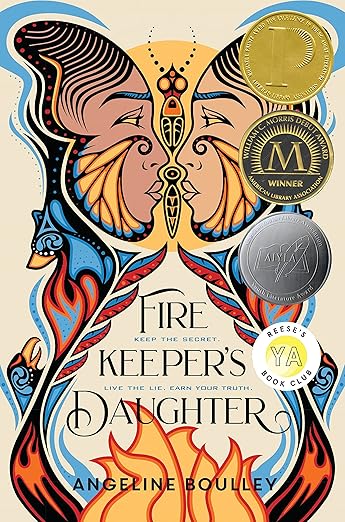
The story mainly takes place in Michigan’s Upper Peninsula, but the events and issues are common to native populations throughout the region—Michigan, Wisconsin, Minnesota, and Ontario. Daunis Fontaine, the first-person storyteller, is a runner and aspiring anatomy student. Her father is Ojibwe (Chippewa), and her mother is white. Her parents weren’t married. The two sides of her family are at odds. Daunis is not yet an enrolled tribal member, and there are strict rules about who could enroll in the tribe. All of this plays into the main and subplots of the story. Daunis postpones her enrollment at the University of Michigan to take care of her mother, who is grieving the death of her brother and caring for an aging mother. It turns out that Daunis not only takes care of her family but becomes compelled to take care of her Ojibwe community when she witnesses the overwhelming meth abuse and a rash of untimely deaths.
Hockey is a community sport on the Upper Peninsula, and hockey players are revered. The “supes” are an elite league hockey team, a stepping-stone for those hoping to play in college or the pros. Jamie Johnson is a new supe hockey player at the local high school who claims to be Cherokee. He befriends Daunis’s brother Levi, and Daunis is nominated by her brother to be Jamie’s ambassador in the community. Although trying to remain platonic, Daunis falls in love with Jamie. He is kind, sympathetic, mature, and seemingly different from other males she has dated. At first, Jamie doesn’t seem to be guilty of the “guy lies” that Daunis finds typical of most men, but as the story progresses, she finds he is probably a better liar than most.
Daunis is forced to understand and confront the deep-seated beliefs of her family and community. It is not easy to witness violence, discrimination, and death. She makes some difficult and mature decisions as she delves deeper into the constructs of the community, such as the tribal police, dividends from the local casino, tribal customs, and priorities of the hockey team.
The author, Angeline Boulley, is from the Sault Sainte Marie Tribe of Chippewa. She weaves Chippewa language and customs into this story with modern and classic themes. I love how she refers to Daunis’s growth and sorting of her life by referring to the regular and hockey worlds. Then, this concept is extended to other themes in the book. The author describes the differences between the worlds of two disparate heritages as parallel to those between hockey and the regular worlds. “But the good stuff happens when worlds collide … osmosis combustion,” says one of the characters. There is also much discussion of worlds when describing the afterlife beliefs—when the Chippewa die, they become part of a different world.
The story is beautiful yet heartbreaking. It is realistic and includes many insightful messages about relations between and among the Ojibwe and the whites. Additionally, the characterizations are complete and relatable; the people in the book are realistic, and learning their stories is a worthwhile experience for readers. This book is marketed for young adults, but it has universal appeal. This author writes from her heart and chooses her words to convey vivid images.


